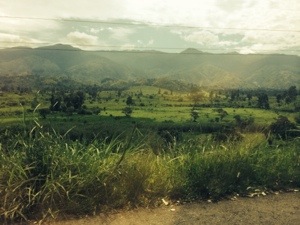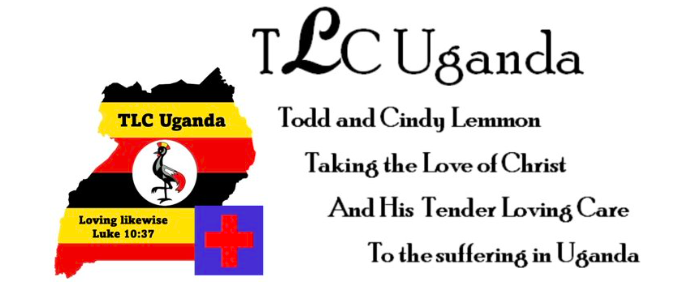Day Five, April 19:
Normally nine hours of road travel would be a bland tale. Even as a kid I remember the car bingo games to make the time pass on long car trips. Today, however, was eventful, educational, eye-opening, and heart-warming.
 As we passed from the Buganda territory into the Tooro kingdom, we noticed a change in the landscape, which became more mountainous. There were more and bigger farms with more apparent organization. The strings of markets had longer gaps between them, and seemed to team with greater numbers of people when we arrived at them. In between those markets and the beautiful farms were some of the most primitive looking houses we have seen. Many looked like so many we passed before, but I became aware today that what I thought were market booths were merely the front of what served as homes to the families of those who operated them. Then I began to see less equipped homes, some just sticks and mud, others even woven papyrus mats or grass thatch huts. Surrounding them were families, all gathering for the Easter holiday when, traditionally, families return home to spend time together feasting. Butcheries were popular as folks prepared for the holiday, with most drawing crowds forming lines as a butcher hacked away at a side of beef right at the roadside. I saw a man dragging a steer's head down the road, using its horns as skis to help him drag the weighty load. Anthony explained that the head would be boiled and the meat used for stew. The poverty I witnessed today made me ashamed to be such a self-indulgent, wealthy person, so oblivious to the lives lived by the less privileged. It would get worse before the day was over.
As we passed from the Buganda territory into the Tooro kingdom, we noticed a change in the landscape, which became more mountainous. There were more and bigger farms with more apparent organization. The strings of markets had longer gaps between them, and seemed to team with greater numbers of people when we arrived at them. In between those markets and the beautiful farms were some of the most primitive looking houses we have seen. Many looked like so many we passed before, but I became aware today that what I thought were market booths were merely the front of what served as homes to the families of those who operated them. Then I began to see less equipped homes, some just sticks and mud, others even woven papyrus mats or grass thatch huts. Surrounding them were families, all gathering for the Easter holiday when, traditionally, families return home to spend time together feasting. Butcheries were popular as folks prepared for the holiday, with most drawing crowds forming lines as a butcher hacked away at a side of beef right at the roadside. I saw a man dragging a steer's head down the road, using its horns as skis to help him drag the weighty load. Anthony explained that the head would be boiled and the meat used for stew. The poverty I witnessed today made me ashamed to be such a self-indulgent, wealthy person, so oblivious to the lives lived by the less privileged. It would get worse before the day was over.
On our way to Fort Portal, however, we got to drive through the Queen Elizabeth National Park, a game preserve. We saw wild elephants, impalas, water buffalo, and some kind of antelope the name of which neither Cindy nor I could remember. Let me tell you, I never imagined we would ever see such things without going on a game drive, and I honestly never imagined we would do that either, so this was a big deal! Especially the elephants. Cindy loves elephants like kindergartners love ice cream. It was an exciting bit of travel!
As we neared Fort Portal, things cleaned up, and it was apparent this was a wealthier region. We found our destination without any trouble and I was amazed at the size and structure of it. Carol Adams, our sweet host, greeted us like family and showed us around the facility of the Youth Encouragement Services (Y.E.S.) hostel, office, and her home. The ten-room, forty-six bed hostel helps to fund the children's home, situated on another property in the village. The home, she explained, nurtures thirty children who suffer from AIDS, a condition that stigmatizes them as "throw away" children. "Why bother caring about you? You're walking dead anyway," Carol described the sentiment regarding such kids. She showed us pictures, however, of kids thriving under the care of the home, and reported of many adopted out and living full, healthy lives in loving homes. In addition to the thirty AIDS inflicted residents of the home, Carol oversees the external project, which ensures that some three hundred children attend school and have necessary supplies, and then follows their progress to ensure the kids do not neglect the gift. By her description she is called by some "the mean Mzungu (white) momma" but is respected by all of them, because they are well aware of her maternal love for all of them. She showed us pictures and told stories of how her love for these people has returned to her in any number of public demonstrations and of quiet gestures. Love like we observed in the heart of this woman and heard in the reports of the objects of her affection gave little doubt that we were in the presence of a heroine of the Kingdom of God, and a pioneer of Christ's loving mercy in these parts.
Carol had a delivery to make, a gift of holiday money from a former employee to a family of twenty-three orphans overseen by their grandmother, who had lost nine of her thirteen children. We went along. As we started out down the washed out clay road, it was good we were in a four-wheel drive truck, a twenty-two year old Suzuki Nomade. No mere car could've made this trip. When we pulled up to the house I remembered some of the stick and mud homes I had seen and thought this was much nicer than it could be. The outside was smooth with defined edges and paint, but was far too small to imagine twenty-three orphans dwelling in it. The inside had concrete floors, and four rooms: one tiny common area, a dark room to either side, one for boys and one for girls, and another room off the girls' room for "Mamma" the old woman who raised all these grandchildren. In each of the bedrooms there were only three or four beds, but several sleep together in each. Outside and behind the house, there was a structure of sticks with a low metal roof. Painted on the side was the word, "kitchen," which I thought strange considering only the oldest kids spoke any English at all, and that was very little. The kitchen was just a dark covered space where a fire was burning at one end, and an empty pot was burning on the coals. There was a pen adjacent to the kitchen, but no livestock in it, although from the smell there had been something recently. The worst, most impoverished housing I have ever seen in the U.S., even in all my years working the lowest income parts of Jacksonville, were palatial compared to this. The children who were there gathered for a quick photo for the visiting Bzungu (white people) and the older ones thanked us for visiting. Our tour guide had been a girl of fifteen both Carol and I suspected of being pregnant, but who seemed intent on trying to hide it. As we left we discussed the old woman's failing health, lack of self-care, refusal to seek Western medical attention, and dependence on traditional herbalists. Upon her demise, the children will be left to fend for themselves, eating what they grow and doing what they can to survive. Three of the twenty-three are in school because of the Y.E.S. program and have a chance at success.
